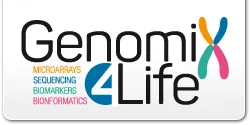Our primary research areas can be broadly classified into two workstreams:
- Use of integration approaches to uncover genotype–phenotype interactions:
We implement bioinformatics pipelines able to integrate different data types to study the interplay between genomics and transcriptomics data with phenotypic data. Our approach can be applied to different types of phenotypes, making it a valuable and versatile strategy with great potential for future research.
- Use of single-cell RNA sequencing to study developmental and stem cell biology:
We have a significant expertise and experience in the analysis of single cell data. We combine cutting-edge techniques in collaboration with dry labs and apply these tools for further understanding of development and diseases.
Our lab is involved in a great network of collaborations to develop multidisciplinary approaches to research efforts, working with faculty members within King’s and other research institutes.
Our Partners
In collaboration with scientists of Genomix4Life, we are studying cell-free DNA and other biomarkers released by tumour cells in circulating blood (liquid biopsy), to investigate the genomic aberrations of primary tumours, to identify key factors linked to disease progression and to screen therapy effectiveness. A bioinformatic pipeline able to analyse and integrate the data will be used to create a better disease classification model that could be applied for other cancer types and other diseases.


